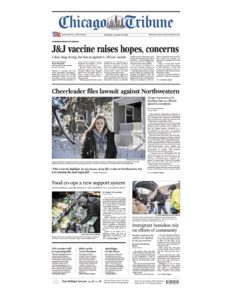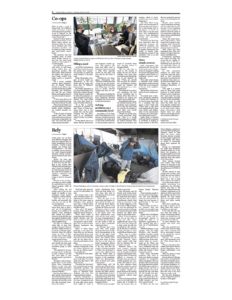
After the success of Logan Square’s Dill Pickle, residents across the Chicago area are looking to launch food co-ops. ‘There is an outcry for a different system.’
In a city with a grocery store on almost every block, the bright green lights that frame Dill Pickle Food Co-Op Market & Deli shine on a steady flow of neighbors turned loyal customers.
The only operating grocery food cooperative in the city, Logan Square’s Dill Pickle is a community-owned store run by its members.
While customers say the Dill Pickle is a fixture in the Logan Square food economy, residents around the region — from Rogers Park to Lombard to Woodstock — are in different stages of trying to launch three other food co-ops.
“There is an outcry for a different system and way of supporting communities,” said Jillian Jason, who is part of an effort to start a co-op in Rogers Park. “It’s a different model of business. Instead of focusing on the growth, a co-op is tailored on the community and focused on supporting people.”
Interest in these kinds of operations increases in turbulent times, experts say. Shopping habits are evolving as residents deal with quarantine boredom, and the desire for fancy cheeses and small-batch microbrews.

The pandemic has also benefited some of these small, locally sourced co-ops that can react more nimbly to interruptions in the food supply.
The Dill Pickle is packed with aisles of bulk pasta, freshly milled flour and specialized produce like black garlic. Most products are organic, and vegan options range widely from bakery goods to prepared meals.
On a recent weekday evening, Mark Weitekamper, of Arcadia Terrace, strolled to the bakery supply aisle during his monthly shopping trip. Weitekamper and his son started baking and making bread in the early months of quarantine.
“I have more time to do this type of stuff since I have more time at home,” he said.
This week, the father-son pair were going to try a new muffin recipe. Weitekamper needed lavender extract.
“I like the idea of buying organic stuff here rather than a chain store so I go out of my way to shop here,” he said. “It’s local and you’re supporting local people.”
Filling a need
As COVID-19 shutdowns closed bars and restaurants last spring, food cooperatives became an option for small retailers in the Midwest.
Philip Shoemaker, manager of local vendor relationships at the Dill Pickle, said he works with more than 70 Midwest-based vendors.
He largely depended on the close relationships he’d built with vendors through weekly farmers market visits when the pandemic created droughts in food production, like meat plants that were shut down because of worker infections.
“It is like a creative ecosystem of vendors,” he said. “Some of these businesses have one to two people that run the entire company. We buy direct, there is no middleman, which is better for producers.”
In late March, the co-op began offering distributors and shoppers creative options. Dry products like pasta and coffee used in restaurant service were sold in bulk. Wine typically poured by the glass was now sold by the bottle at retail.
“Distributors are struggling,” Shoemaker said. “The beer world makes tons of kegs for on tap service, and almost all brewers have quit filling kegs and have had to make smaller batches that they are canning.”
Shoemaker joked that the store sells more bottled beer from Hopewell Brewing Company than the brewery, located just next door.
Solving problems on a community level
According to C.E. Pugh, CEO of the National Co+op Grocers, a business services cooperative for retail food co-ops in the United States, co-op ownership comes as a result of uncertain times and changing values in shopping habits.
“We can only take so much in this country of saying, ‘me, me, me.’ We are realizing now more than ever that people should take care of one another,” he said. “These are periods that are good for cooperative development because people get together and solve problems on a community level.”

The National Co+op Grocers represents 147 food co-ops, including five in Illinois. More than 90% of members are natural and organic stores, Pugh said.
As neighborhoods see retail closures because of the pandemic, some communities in the city and across the suburbs are seeking to open their own locally sourced food shops.
“People can see the value of local ownership,” Pugh said. “This is a locally owned alternative to publicly traded company. They support local products and vendors, which is fundamental to the core of those businesses.”
The Food Shed Co-op, which was incorporated in 2014, announced in December it had bought land in Woodstock to build its store. The co-op has more than 700 neighborhood owners from McHenry County and surrounding communities.
“Interest in the Shed has been impressive since the beginning, however the COVID-19 pandemic has generated greater demand as people experienced the reality of supply chain breakdowns caused by the pandemic,” the co-op said in a statement.
Not a simple process
Food cooperatives first debuted in the ’70s and ’80s as the main source of groceries for shoppers looking for natural and organic food products rarely found in a traditional grocery store, Pugh said.
Once other stores began to regularly stock natural and organic products in the 2000s, the co-op continued to be the niche neighborhood grocer.
But opening a food cooperative is not a simple process.
“It usually takes a thousand community members to invest and volunteer to try to get it open; it’s not like it’s a company that just opens a store,” Pugh said. “These food co-ops serve their neighborhood so they move slowly and deliberately. It is the communities’ resources, not a sole proprietor risking their money.”
Kathy Nash, co-founder of Prairie Food Co-op based in Lombard, is hoping to break ground in fall 2022. She has worked the past six years on fundraising for the store.

“People aren’t familiar with a cooperative business, and it’s a hard idea to sell,” she said. “It’s not a business making anyone millions. It exists to meet the needs of the community rather than make a group of individuals a lot of money.”
Jason, the board president of Wild Onion, a food cooperative hoping to open in Rogers Park, echoed the difficulties in organizing grassroots grocery stores.
Wild Onion has been organizing since 2012 with backers in Rogers Park, Evanston and Edgewater.
Community members buy a share for $250. The co-op has no outside investors and is led by a leadership team elected by the ownership. There are currently more than 1,600 owners.
As the pandemic changed the retail landscape, the team has struggled to find storefront space, but it is committed to its mission. Once open, co-ops have proved they can be creative and effective at sustaining themselves, Jason said.
“The path is a narrow path for those who make products in small batches trying to enter a retail market,” Jason said. “In some ways the pandemic brought us closer to the community. We don’t want to walk down the street and see these big-box retailers that we don’t have a connection to; we don’t want a shopping experience that doesn’t meet our values when we are trying to nourish ourselves in this time.”
Twitter @JessicaVillag

Jessica Villagomez
Chicago Tribune



Leave A Comment